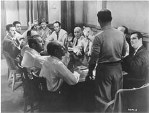 This is the question posed by a criminal procedure case the Supreme Court recently agreed to hear. In Puckett v. United States (lower court decision at 505 F.3d 377), the prosecutor and defendant entered into a plea agreement: in return for Puckett’s guilty plea, the prosecutor agreed to support Puckett’s request for a sentence reduction based on acceptance of responsibility. When sentencing occurred, however, the prosecutor actually argued against acceptance, and the district court judge denied the requested reduction. On appeal, both sides agreed the prosecutor had breached the plea deal, but did not agree on whether Puckett was entitled to withdraw his guilty plea (the typical remedy for a breach). The problem was that Puckett’s lawyer neglected to argue at sentencing that there had been a breach. As a result of this forfeiture, the Fifth Circuit reviewed Puckett’s breach claim using the “plain error” standard, which required Puckett to show that the breach actually affected the sentence he received–a difficult burden in most cases because it is hard to know for sure the extent to which a sentencing judge is influenced by a prosecutor’s argument. Absent the lawyer’s neglect, Puckett would have been entitled to relief without showing prejudice under Santobello v. New York, 404 U.S. 257 (1971).
This is the question posed by a criminal procedure case the Supreme Court recently agreed to hear. In Puckett v. United States (lower court decision at 505 F.3d 377), the prosecutor and defendant entered into a plea agreement: in return for Puckett’s guilty plea, the prosecutor agreed to support Puckett’s request for a sentence reduction based on acceptance of responsibility. When sentencing occurred, however, the prosecutor actually argued against acceptance, and the district court judge denied the requested reduction. On appeal, both sides agreed the prosecutor had breached the plea deal, but did not agree on whether Puckett was entitled to withdraw his guilty plea (the typical remedy for a breach). The problem was that Puckett’s lawyer neglected to argue at sentencing that there had been a breach. As a result of this forfeiture, the Fifth Circuit reviewed Puckett’s breach claim using the “plain error” standard, which required Puckett to show that the breach actually affected the sentence he received–a difficult burden in most cases because it is hard to know for sure the extent to which a sentencing judge is influenced by a prosecutor’s argument. Absent the lawyer’s neglect, Puckett would have been entitled to relief without showing prejudice under Santobello v. New York, 404 U.S. 257 (1971).
In the Supreme Court, the parties will argue about whether Puckett and others like him should be penalized through plain error review when their lawyers fail to object at sentencing to the breach of a plea agreement. As a general matter, I do not care for the “gotcha” games that appellate courts play through forfeiture and plain error doctrines. I appreciate the judicial economy concerns that are used to justify the requirement that lawyers make all objections to trial court proceedings in a timely fashion, but the stakes are too high in criminal cases to hold clients strictly accountable for their lawyers’ mistakes–especially considering that most criminal defendants cannot afford to pick their own lawyers and are stuck with whomever is appointed to represent them. I might feel differently in cases in which there is some good reason to think the lawyer intentionally held back on an objection or argument for tactical reasons. But such cases are rare. I hope, then, that the Supreme Court make clear in Puckett that breach-of-plea-agreement claims are not subject to plain error review.
 Thanks to friend of the blog, Jack Sargent, for pointing me to this fascinating dispute before the U.S Supreme Court now concerning the sealing of a record in an employment discrimination case.
Thanks to friend of the blog, Jack Sargent, for pointing me to this fascinating dispute before the U.S Supreme Court now concerning the sealing of a record in an employment discrimination case.

